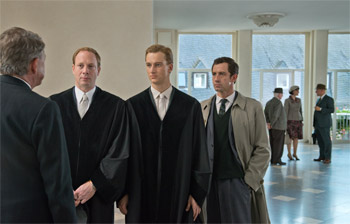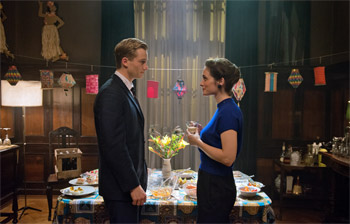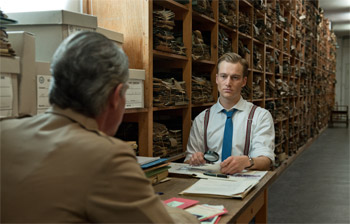Giulio Ricciarelli Labyrinth of Lies Interview

Giulio Ricciarelli Labyrinth of Lies Interview
Cast: André Szymanski, Alexander Fehling, Friederike Becht
Director: Giulio Ricciarelli
Genre: Drama, History
Rated: M
Running Time: 118 minutes
Synopsis: Frankfurt am Main 1958: The young public prosecutor Johann Radmann (Alexander Fehling) is at the very start of his career and, like all beginners, is sent to work on traffic offenses. The ambitious, idealistic jurist always strictly follows the law and does not even turn a blind eye to the enchanting traffic offender Marlene Wondrak (Friederike Becht). Nevertheless, he gives her 20 marks of his own money so that she can pay her fine. Outraged, she calls him a nitpicker. And Johann? He's head over heels in love!
When the journalist Thomas Gnielka (André Szymanski) makes a ruckus in the lobby of the Public Prosecutor's office, Johann Radmann pricks up his ears: By chance, Gnielka's friend Simon Kirsch (Johannes Krisch), an artist and former Auschwitz inmate, recognized the Gymnasium teacher Alois Schulz as one of his tormenters from the concentration camp, but no police station wants to file a complaint. The Public Prosecutor's office also refuses to investigate, and Senior Public Prosecutor Walter Friedberg (Robert Hunger-Bühler brusquely shows Gnielka and Kirsch the door. Only Johann pays no attention to his superiors' orders. Curious, he begins to investigate the matter on his own. Johann's research in the school board and U.S. Army Document Center proves that Schulz actually was a member of the Waffen SS in Auschwitz – and that this was the reason why he was not allowed to teach in a state-run school. When Johann reports about this at the weekly get-together of public prosecutors, Friedberg reluctantly promises to pass the case on to the Ministry of Culture. During a chance meeting with Gnielka at the courthouse, Johann proudly reports that he has successfully taken care of the matter. But Gnielka doubts that Schulz was truly suspended from his duties. And he notes that Johann – like most people of his generation – have absolutely no idea what "Auschwitz" truly was. "A shame," as Gnielka sees it.
To remedy this information gap, Johann tries to find out more about Auschwitz. This turns out to be anything but easy, since the library tells him that the sole available book on the topic would have to be ordered, which would mean a wait of at least two months.
Sneaking into the Gymnasium, Johann sees that Gnielka's doubts were justified: Schulz continues to teach there without any  impediment. In the meantime, Gnielka has resorted to action and stolen the Schulz file from Johann's office. He then publishes a fiery article about this "unspeakable scandal" in the Frankfurter Rundschau. As a consequence, Johann is requested to appear at the office of the Hessian Prosecutor General Fritz Bauer (Gert Voss). Although he can convincingly assure his highest superior that he did not give the journalist any documents concerning internal matters, what he hears from Bauer makes him feel anything but optimistic: Bauer makes it absolutely clear that the civil service is still permeated with Nazi sympathizers and executors, who have practically nothing to worry about, since their offenses have expired under the statute of limitations. All their offenses – except murder. Without concrete proof of murder, a former war criminal cannot be put on trial and called to account.
impediment. In the meantime, Gnielka has resorted to action and stolen the Schulz file from Johann's office. He then publishes a fiery article about this "unspeakable scandal" in the Frankfurter Rundschau. As a consequence, Johann is requested to appear at the office of the Hessian Prosecutor General Fritz Bauer (Gert Voss). Although he can convincingly assure his highest superior that he did not give the journalist any documents concerning internal matters, what he hears from Bauer makes him feel anything but optimistic: Bauer makes it absolutely clear that the civil service is still permeated with Nazi sympathizers and executors, who have practically nothing to worry about, since their offenses have expired under the statute of limitations. All their offenses – except murder. Without concrete proof of murder, a former war criminal cannot be put on trial and called to account.
Gnielka apologizes to Johann for stealing the files and invites him to a party in his flat. There Johann is agreeably surprised to meet up with Marlene Wondrak again – and the sparks immediately start flying between the two. This time, no traffic offense can prevent them from getting closer. Also among the guests at the party is Simon Kirsch, who drinks too much and has to be brought home late at night by Johann and Gnielka. They want to help him with his request for financial compensation, and go through his private papers. There they accidentally discover an official list containing the names of SS men who served in Auschwitz. They immediately show the list to Fritz Bauer, who realizes how explosive this document is: the names of the perpetrators of Auschwitz – just what had always been missing for them to take action against possible individual perpetrators. Without losing any time, Bauer entrusts Johann with the direction of all further investigations. However, he warns him: "This is a labyrinth. Don't lose yourself in it!"
Johann throws himself heart and soul into his new task, burrows through endless piles of documents and begins searching specifically for the names of victims and witnesses. With the help of Hermann Langbein (Lukas Miko), the Secretary General of the International Auschwitz Committee, he finally succeeds in questioning the first witnesses. Shattered by an emotional testimony, Johann begins to imagine just how vast was the scope of the deeds that were committed in Auschwitz. And it becomes clear to him that there is a long road ahead if he wants to responsibly accomplish his mission and to bring the guilty to justice.
The Document Center of the U. S. Army has files on 600,000 men. 8,000 of them worked at Auschwitz, and are all considered as suspects. Johann keeps running into obstacles, however: the police refuse to take action, and the other authorities stall. Seeing no other possibility, Johann has all the German telephone books sent to him in order to find the addresses of the names he has since uncovered.
At least he convinces Fritz Bauer to assign his colleague Otto Haller (Johann von Bülow) to his team. Apart from Haller and the "good soul" of the Prosecutor's office Erika Schmitt (Hansi Jochmann), he can expect no further help, as Senior Public Prosecutor Friedberg refuses to give him any other support. He considers the case as pointless, since it is impossible to prove that the suspects had the intention of killing. "We all had no choice!" He finds it reprehensible to open up old wounds: "Do you want every young man in this country to wonder whether his father was a murderer?" – this is precisely Johann Radmann's goal.
Johann has fallen hopelessly in love with Marlene Wondrak. However, his private life suffers increasingly under his workload. And while he – much to her dismay – digs ever deeper into the past, she fulfills a dream in the here and now: she sets up her own fashion shop as part of the "economic-miracle" euphoria. Johann comes to the successful opening of her shop, but Johann's mind is elsewhere.
 Johann's mother tells him that his father – whom Johann deeply revered and who still has not returned home from detainment as a prisoner of war – was also a member of the NSDAP. Johann's world falls apart when he finds confirmation for this statement in the American files. Plagued by nightmares, he drinks too much, quarrels with Marlene and Gnielka as well as Fritz Bauer, and slides further and further into a labyrinth of guilt and lies in his search for the truth. Then he quits his job as a public prosecutor and takes on a lucrative offer from an expanding law practice. Johann had always wanted to fight for the Good; now he no longer knows what the Good is… The outcome of the entire trial is at stake. And yet: what Johann finally brings to light will change Germany forever.
Johann's mother tells him that his father – whom Johann deeply revered and who still has not returned home from detainment as a prisoner of war – was also a member of the NSDAP. Johann's world falls apart when he finds confirmation for this statement in the American files. Plagued by nightmares, he drinks too much, quarrels with Marlene and Gnielka as well as Fritz Bauer, and slides further and further into a labyrinth of guilt and lies in his search for the truth. Then he quits his job as a public prosecutor and takes on a lucrative offer from an expanding law practice. Johann had always wanted to fight for the Good; now he no longer knows what the Good is… The outcome of the entire trial is at stake. And yet: what Johann finally brings to light will change Germany forever. Labyrinth of Lies
Release Date: March 31st, 2016
Director's Note By Giulio Ricciarelli
A story of personal courage, of fighting for what is right, and a story of redemption.
Germany in 1958. An atmosphere of frantic optimism and denial, a country rebuilding itself. Yet the shadow of its war crimes is catching up, literally around the corner.
I feel the theme dictates the aesthetic choices. The camera work is classic: composed shots calibrate what we see and what is left to the imagination. Space and time are designed for strong acting; emotions that carry the story forward. Smooth editing, rhythmic and precise.
I want the audience to be immersed only in the story, the complex narration made easier by an intense, minimalist score. No part should draw attention to itself and detract from the story. Trust in the story; a story for our times.
We live in an age of self-publishing, in which 13-year-olds are their own PR department, while as individuals we feel we cannot have any influence on such a globalized, networked, and complex world. In this age, this story reminds us that it is always individuals who bring about change and push forward civilization.
This struggle, the pain and the beauty of this struggle – this is the core of this movie.
Interview with Giulio Ricciarelli
Question: How did you react when you were confronted with the theme for the first time?
Giulio Ricciarelli: I thought the story was incredible. I was particularly unable to believe that many Germans in the late 1950s had never heard about Auschwitz. It was only in the course of my research that I concluded that this was indeed so. As a young person, I had always been under the impression that the Nazi period had been amply studied and treated in Germany after 1945 through history lessons, a variety of films and visits to concentration camp memorials.
But the truth is: after the end of WWII, just about nothing was treated comprehensively for several years; instead, there was an attempt to silence the dark past. This was a chapter one simply did not talk about. Nor about the perpetrators, nor about the victims. Of course there were people who knew about Auschwitz, but the majority of the Germans did not. This topic would have continued to be suppressed if four courageous people – a Prosecutor General and three young public prosecutors – had not overcome all obstacles to push through their vision of the Frankfurt Trial. Four heroes who changed Germany forever.
Question: How would you characterize your main character, the young public prosecutor Johann Radmann?
Giulio Ricciarelli: Johann is a self-assured, very Germanic, rather formalist jurist with a humanistic education and clear moral values. His Achilles' heel is his rigid black and white way of viewing things. At the beginning he thinks he knows what's right and what's wrong. Only in the course of the events does he realise that It is not up to him to judge other people. He can only conduct this trial with humility.
 Question: In your film, you also provide a forum for the opposite side.
Question: In your film, you also provide a forum for the opposite side. Giulio Ricciarelli: Yes, this meant a lot to us. Of course we feel that we should absolutely confront our past. But the opposite position can also claim some good arguments for itself. The German Federal Chancellor Konrad Adenauer had set up the doctrine that one had to draw the line and spread the cloak of silence over the past. This was the official stance which Fritz Bauer and his comrades-in-arms had to knock down. And the question posed by Senior Public Prosecutor Friedberg to Johann Radmann reduces it to one point: "Do you want every young person to wonder whether his father was a murderer or not?"
Question: To what extent were you able to borrow original quotes when writing the dialogues?
Giulio Ricciarelli: Many statements by Fritz Bauer have been preserved, mainly through the work of the Fritz Bauer Institute. Of course we were also able to base ourselves on witnesses' statements from the trial. And Attorney Lichter's perfidious argumentation that the "selection" was an act of humanity intended to save human lives, really does stem from a lawyer's defense strategy in the Frankfurt Trials. As to the historical facts, we are as correct and precise as possible. Only in conjunction with the inner life of the characters did we allow ourselves narrative liberties. We don't want to give viewers a history lesson, but an emotional cinematic experience. That is why we've tried again and again to loosen up the action though humor – not through artificial slapstick elements, but through a gentle humor that arises from the characters. I feel it is wrong to say: "Oh my god, it's a serious theme, you're not supposed to laugh!"
Labyrinth of Lies
Release Date: March 31st, 2016
MORE
- Mission: Impossible Fallout
- Glenn Close The Wife
- Allison Chhorn Stanley's Mouth Interview
- Benicio Del Toro Sicario: Day of the Soldado
- Dame Judi Dench Tea With The Dames
- Sandra Bullock Ocean's 8
- Chris Pratt Jurassic World: Fallen Kingdom
- Claudia Sangiorgi Dalimore and Michelle Grace...
- Rachel McAdams Disobedience Interview
- Sebastián Lelio and Alessandro Nivola...
- Perri Cummings Trench Interview



